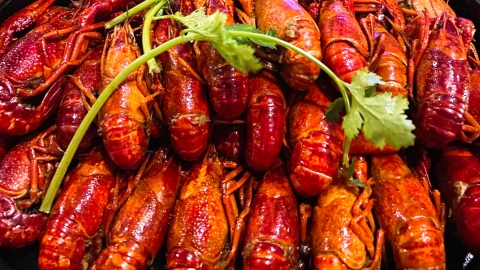What Should Not Be Eaten After Consuming Small Lobsters
After consuming crayfish, it is generally not advisable to eat fruits high in tannic acid, cold-natured foods, high-purine foods, fruits high in vitamin C, or alcoholic beverages.

1. Fruits high in tannic acid: Such as grapes, pomegranates, and persimmons. The tannic acid in these fruits can bind with the protein in crayfish, easily forming indigestible precipitates that may cause bloating, abdominal pain, or gastric stones. It is recommended to wait at least 2 hours after eating crayfish before consuming these fruits to avoid increasing the burden on the gastrointestinal tract.
2. Cold-natured foods: Crayfish themselves are relatively cold in nature. Consuming them together with other cold foods or beverages such as ice drinks, watermelon, or bitter melon may lead to cold deficiency of the spleen and stomach, causing diarrhea or abdominal pain. Individuals with weak constitutions should especially avoid alternating intake of hot and cold foods. It is recommended to substitute cold items with beverages at room temperature and pair meals with warm-natured vegetables such as ginger or carrots.
3. High-purine foods: Crayfish are considered a medium-to-high purine food. Consuming them together with other high-purine foods such as organ meats, concentrated meat broths, and mushrooms may increase uric acid production, potentially triggering joint pain in individuals with gout. Even for healthy individuals, total intake should be controlled to avoid long-term excessive consumption, which could increase metabolic strain.
4. Fruits high in vitamin C: Large amounts of vitamin C may potentially react with arsenic compounds in shrimp, although the risk is low under normal dietary amounts. However, to be safe, avoid consuming large quantities of lemon, kiwi fruit, or fresh dates in a short time. Individuals with weaker kidney function should consider spacing out their consumption appropriately.
5. Alcoholic beverages: Alcohol accelerates the metabolism of purines in crayfish, increasing blood uric acid levels and potentially triggering gout. At the same time, alcohol irritates the gastric mucosa and may exacerbate gastrointestinal discomfort when combined with the protein in crayfish. It is recommended to substitute alcohol with tea or soda water for a healthier dining experience.
When selecting crayfish, ensure they are fresh and avoid purchasing discolored or spoiled products. Remove the intestinal tract of the crayfish thoroughly before cooking to ensure food safety. Maintaining a diverse diet and balanced intake of various nutrients contributes to overall health.








